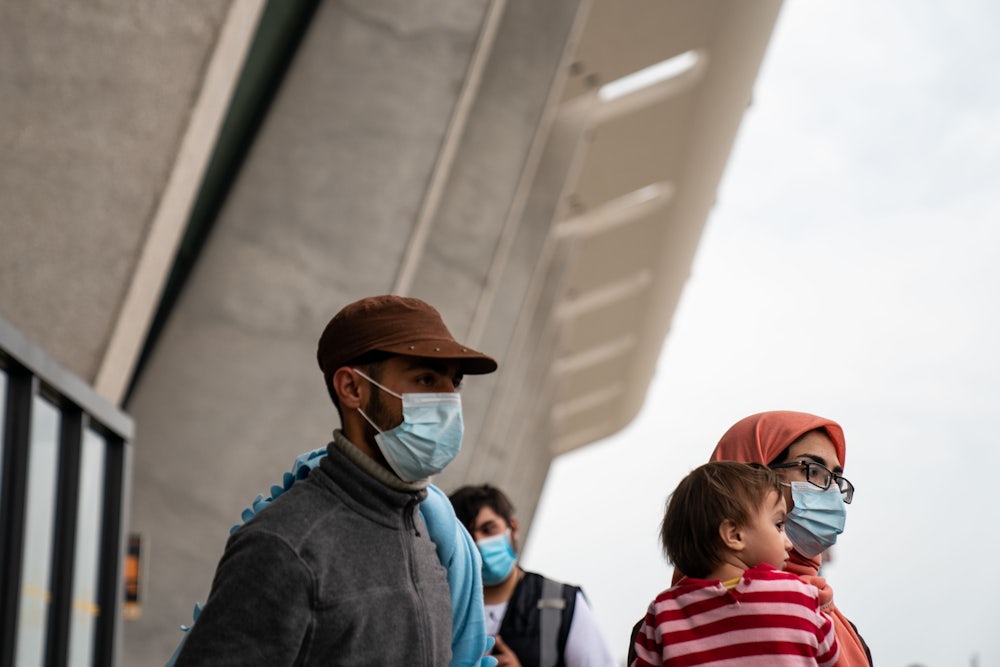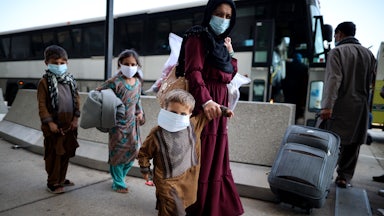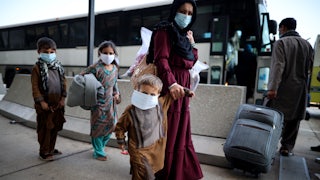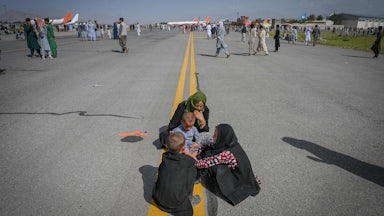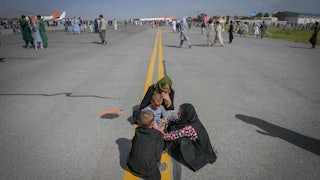The church fellowship hall, often the site of meetings between clients and their case workers, was quiet. There had been less activity at the resettlement office of late; it was Ramadan, the time when Muslims fast between sunrise and sundown. But behind the double doors leading to the warren of administrative offices, the employees providing services through the Afghan Placement and Assistance program—many of them also fasting for Ramadan—were still busy, making phone calls and conducting work on their computers.
The temporary operation, hosted in a Lutheran church in Northern Virginia, is led by the Lutheran Immigration and Refugee Services, or LIRS. The office provides a variety of resettlement services for the Afghans who arrived in the United States in recent months, after Americans withdrew from Afghanistan and the country was retaken by the Taliban last summer. The employees have assisted more than 1,200 clients, helping them secure housing, enroll their children in school, apply for benefits, and find jobs. They have hosted cultural orientations and provided employment counseling, facilitating the transition within a new community.
“We’re now entering the second phase. The second phase is, of course, about self-sufficiency for clients,” Khalis Noori, the director for field operations, told me when I visited the office on a crisp April day.
Refugees face significant challenges to becoming self-sufficient, not least of which is the difficulty of being separated from family members and the attendant culture shock of arriving in an unfamiliar country. “When you come from a country like Afghanistan, America is like a new planet,” said Zaker Hussain, an employment specialist at the office. Hussain, who arrived in the U.S. from Afghanistan in 2014, looks for job opportunities for recently arrived individuals and helps clients build résumés and prepare for interviews. But there are some difficulties in finding and maintaining jobs, such as a lack of adequate public transportation and the high cost of living.
In the suburbs of Northern Virginia, a car may be a necessity to obtain and hold down a job. But Hussain said that some of his clients cannot read or write in English, meaning that they can’t pass a driving test to obtain a license. And without a steady job, clients may not have the income to remain in their apartments. Hussain described a meeting with a client of his who is a single mother, who was told by the leasing office of her residence that she would need to verify her income or vacate the place. “I was very embarrassed because I didn’t have good answers for her. All I could do is just appease her [with] some words, but those words cannot help,” he said.
Noori said that their office had helped all of their clients obtain permanent housing, with the exception of one family, although he said that family was “at the top of the list.” “Out of 1,258 people we’ve served here, we’ve managed to employ 91 individuals. Which is a good number, but it could have been better,” Noori said. He highlighted transportation and cultural differences—for example, needing a one-page résumé in the U.S., as compared to a multiple-page résumé in Afghanistan—as barriers to obtaining jobs.
“We do say that Virginia—America overall—is the land of opportunity; there’s lots of work opportunities, but it’s not it. You enter into those opportunities, but there are so many limitations,” said Fatima Momin, the financial manager at the office, who arrived in the U.S. in September. She also noted that some jobs have permanent residency requirements, which many Afghan evacuees lack. “You cannot avail that opportunity, so you cannot call that ‘opportunity.’”
Many Afghans in the U.S. were evacuated using humanitarian parole, which allowed the Biden administration to bypass the slow-moving refugee process. More than 70,000 Afghans have been granted parole to enter the U.S. as of last November, according to the Department of Homeland Security. But parolees do not have a direct path to permanent residency, unlike refugees or people who enter the U.S. with a special immigrant visa, or SIV. An Afghan Adjustment Act—similar to what was previously provided for Cubans, people from Southeast Asia, and Iraqis—would provide a pathway for parolees to apply for permanent status after one year.
Although some lawmakers have spoken about the need to pass an Afghan Adjustment Act, one has yet to be introduced. Senators Amy Klobuchar and Chris Coons and Representative Earl Blumenauer are expected to introduce such a bill in the House and Senate respectively. A person familiar with negotiations told The New Republic that lawmakers were waiting to introduce the bill until the text had bipartisan sign-off, and therefore a greater chance of passing in Congress.
/ In honor of Earth Day, TNR’s climate coverage is free to registered users until April 29. Start reading now.
Senator Tim Kaine of Virginia told The New Republic that he hoped such a bill could be accomplished toward the midpoint of the two years that the parolees are legally allowed to remain in the U.S. “I’m confident that we will get it done. I just don’t want to wait until one month [before] the two years [is up] so that everybody’s nervous,” Kaine said. “In terms of telling you when the Senate will act … I don’t really know right now.”
But for Afghan parolees, the uncertainty can be debilitating. “They don’t know if they have to apply for asylum, or if they have to apply to extend their work permits, or if they are going to get green cards,” said Maiwand Basiri, an Afghan Parolee case manager. “These are the questions that we face every day, and we cannot even guide them for legal services because we don’t even know what’s going to happen to their legal status in America.”
Their temporary parole status will expire after two years, and any Afghan seeking asylum would need to file an application within one year of arriving in the U.S. Both the asylum and SIV application process are extremely backlogged. The Biden administration has allowed Afghans living in the U.S. without a path to legal residency to apply for temporary protected status, or TPS, granting them 18 months of protection from deportation and eligibility for a work permit. But most Afghans were paroled into the U.S. and allowed to apply for work permits through Operation Allies Welcome already, and TPS application processing has—you guessed it—a massive backlog that could prevent applicants from receiving the status before it expires.
“If that is passed, then all this burden on our shoulders, the hassle of our clients, and also the uncertainty of the future, will be vanished,” Noori said. “If that does not pass, then all the stakeholders in this will have their fair share of trouble, [whether] it’s the client, or us, or people in the community.”
Most of the staff at the LIRS office in Northern Virginia are themselves recent arrivals to the U.S. This means that they are able to empathize with the clients they assist, but their work can also be difficult, as they too have undergone a similarly traumatic experience. “It has been challenging, if you yourself have gone through something very similar or exactly the same and then trying to help those people who have been in that situation,” Noori said. “But it has advantages to it. Because I could understand, I could be more helpful.”
The employees at the Northern Virginia office also emphasized the need to focus on family reunification. Basiri, who worked as a translator with the American armed forces for over 14 years, was able to evacuate from Afghanistan through the relocation process in mid-August. But he still has many immediate family members and friends in Afghanistan. “Every day before coming to work, I make sure that I speak to my mother, to my father, to my sisters and my brothers,” Basiri said.
Momin mentioned her siblings, who have been referred for the priority 1 program but are waiting in a third country where they face high cost-of-living expenses and cannot enroll their children in school. She explained that it was challenging for family members who have arrived in America but who still need to support their family members abroad. “We are facing the challenges ourselves; we are starting our life from zero. So many things we have to do for our lives. But at the same time, we have to save and support those families,” Momin said.
Noori worried that the plight of the Afghan people is being forgotten, particularly in light of the Russian invasion of Ukraine. “I genuinely believe that is a tragedy, what’s happening in Ukraine, it’s heartbreaking,” he said. But he said that the situation is still dire in Afghanistan as well, relating the story of his own brother-in-law, a journalist who was abducted three months ago and whose fate is still unclear.
“In every household, there is someone being abducted, there’s someone that’s been tortured, there’s someone that has been killed, and we don’t see as much attention from the media, from the international organizations like the United Nations, especially the UNHCR,” Noori said, referring to the United Nations refugee agency. “Somehow, Ukraine has put this shadow over Afghanistan.”
